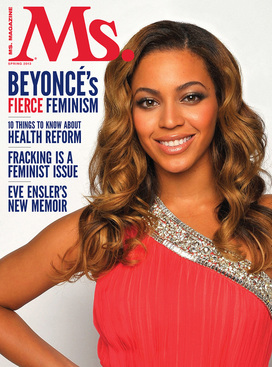 Bey covers feminist mag, Ms. (Spring 2013)
Bey covers feminist mag, Ms. (Spring 2013) Beyonce` became the focus of feminist debate and discussion with several “girl-power” anthems that resulted in being labeled “a male-basher” by men and plenty of her own interview comments regarding inspiring women (comments that have gotten only more political and forthright with time). Much of media quickly pegged her the new face of feminism in music and a great example to women and girls. Meanwhile, this was/is challenged by some feminists primarily because of her sex appeal, lyrical content and most recently, her marriage. In my 2011 article, “Beyonce Isn’t a Feminist?” I explained why I believe the arguments that she isn’t a feminist because “she’s too sexy” and “sings about love too often” are bogus and reinforce stereotypes about the movement. Despite being one of the few current pop acts to be so vocal about gender, Beyonce’s efforts are habitually snubbed and ridiculed. Beyonce` raised money & headlined a concert for the women’s organization Chime for Change, but it was said performing in a “sexy leotard” was countering. Even though she was clearly encouraging women to not let men take advantage of their emotional love and loyalty by being casual in relationships and not committing with 2008’s “Put a Ring on It,” the song was described as limiting female value to marriage. Although “Run the World (Girls)” had lyrics that addressed economic disparity, encouraged men to respect our strengths, boasted education and how we successfully handle motherhood & business, its music video was slammed because, again, the costumes were “too sexy” and the part in which the women-warriors dance in front of stunned male guards symbolized sexual subjection, not the confrontation Beyonce` intended it to be.
On the other side of the feminist community, agitation boils amongst those who welcome Beyonce’s presence and find all the inspection to be judgmental, nit-picky and even racially biased. A few blog articles (including “Okay, Lay Off Beyonce` Already” by Feministe) have gone so far as to imply some of the criticisms are ironically anti-feminist themselves and do the very thing they charge Beyonce` with: shaming women and supporting the views of a male dominated society. Some black feminist writers contend that Beyonce` is just another woman of color whose feminism is unfairly scrutinized and measured, while other white, more controversial figures in the discussion go without evaluation. Writer Lauren Rankin (who is Caucasian) highlighted that Lena Dunham’s, the star of the TV series “Girls,” status as a feminist is never questioned, in spite of her character being far more sexualized than Beyonce’s real-life image. The “is she or is she not” dialogue surrounding Beyonce` is so thick, Rutgers University designed a women’s and gender studies course based on it, entitled “Politicizing Beyonce`.” The definitive sign that “stuff got real” was when “Ms.” magazine, the first major feminist publication started by key leader Gloria Steinem, put the King B on the cover with the headline “Beyonce’s Fierce Feminism (the piece reportedly reviewed both sides of the debate),” receiving major backlash.


 RSS Feed
RSS Feed